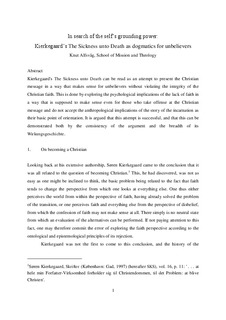| dc.contributor.author | Alfsvåg, Knut | |
| dc.date.accessioned | 2015-05-07T10:11:28Z | |
| dc.date.accessioned | 2016-04-22T14:52:13Z | |
| dc.date.available | 2015-05-07T10:11:28Z | |
| dc.date.available | 2016-04-22T14:52:13Z | |
| dc.date.issued | 2014 | |
| dc.identifier.citation | International Journal of Systematic Theology 2014, 16(4):373-389 | nb_NO |
| dc.identifier.issn | 1468-2400 | |
| dc.identifier.uri | http://hdl.handle.net/11250/2387080 | |
| dc.description | - | nb_NO |
| dc.description.abstract | Kierkegaard's The Sickness unto Death can be read as an attempt to present the Christian message in a way that makes sense for unbelievers without violating the integrity of the Christian faith. This is done by exploring the psychological implications of the lack of faith in a way that is supposed to make sense even for those who take offence at the Christian message and do not accept the anthropological implications of the story of the incarnation as their basic point of orientation. It is argued that this attempt is successful, and that this can be demonstrated both by the consistency of the argument and the breadth of its Wirkungsgeschichte. | nb_NO |
| dc.language.iso | eng | nb_NO |
| dc.title | In Search of the Self’s Grounding Power : Kierkegaard’s The Sickness unto Death as Dogmatics for Unbelievers | nb_NO |
| dc.type | Journal article | nb_NO |
| dc.date.updated | 2015-05-07T10:11:28Z | |
| dc.subject.nsi | VDP::Humaniora: 000::Teologi og religionsvitenskap: 150::Teologi: 151 | nb_NO |
| dc.subject.nsi | VDP::Humanities: 000::Theology and religious studies: 150::Theology: 151 | nb_NO |
| dc.source.pagenumber | 373-389 | nb_NO |
| dc.source.volume | 16 | nb_NO |
| dc.source.journal | International Journal of Systematic Theology | nb_NO |
| dc.source.issue | 4 | nb_NO |
| dc.identifier.doi | 10.1111/ijst.12072 | |
| dc.identifier.cristin | 1159327 | |
| dc.subject.keyword | anthropology | |
| dc.subject.keyword | christology | |
| dc.subject.keyword | Kierkegaard, Søren | |

